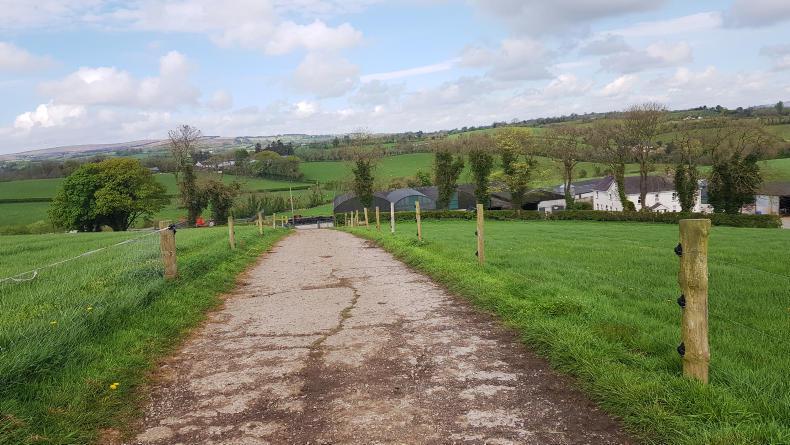Over 2,000 sites passed in rural NI each year
The current rules for planning permission allow “a relatively steady” rate of approvals for new houses in the NI countryside, Infrastructure Minister Nichola Mallon has said.
Over the last six years, 9,800 applications for single dwellings in the countryside were approved in NI, along with 3,800 replacement dwellings.
This equates to 2,260 sites being approved each year.
At Stormont on Monday, Sinn Féin MLA Jemma Dolan asked Minister Mallon if her department would make changes to existing planning rules.
She suggested allowing a maximum of three houses on a gap site instead of two and letting farming families get planning permission for a house every five years rather than every 10.
In response, Minister Mallon appeared reluctant to make the suggested changes to the existing planning rules, which are known as the SPPS.
“Subject to acceptable proposals in appropriate locations, the SPPS offers considerable development opportunities for all people who wish to live in the countryside,” the minister said.
Sheep scab cases not reported to DAERA
There were only 33 cases of sheep scab reported to DAERA from 2015 to 2020, Agriculture Minister Edwin Poots has said.
Sheep scab is a highly contagious disease which can lead to wool loss, reduced animal performance and welfare issues. It is a notifiable disease, so farmers are required to report outbreaks to government authorities.
However, reports from local farmers and vets indicate that the disease is a problem in several parts of NI, so the official figures would suggest that cases are being under-reported to DAERA.
One reason for this could be that farmers with a sheep scab outbreak want to avoid flock movement restrictions and visits from vets and government officials, although taking this approach means an effective control plan will not be put in place for infected farms.
In response to a written question from West Tyrone MLA Declan McAleer, Minister Poots confirmed that restrictions are not lifted until “a thorough disease investigation” has taken place and “all necessary actions have been completed”.
Ministers under fire over NZ trade deal
Two government ministers were criticised by MPs last week for ignoring the concerns of UK farmers when agreeing new post-Brexit trade deals.
During a committee meeting at Westminster, Farming Minister Victoria Prentis and Trade Minister Penny Mordaunt were repeatedly asked if food which is below UK standards will be imported under new trade deals with Australia and New Zealand.
“Within a free trade agreement, you can put in place clauses about non-regression, or how much market access you allow for meat of a particular standard, or how much you are going to co-operate on anti-microbial resistance, for example,” Prentis maintained.
Meanwhile, NI Agriculture Minister Edwin Poots has described the recently announced New Zealand deal as “a very serious threat” to local farmers. He expressed disappointment that officials from devolved regions of the UK were not allowed to have greater involvement in trade negotiations.
“This is something that needs to change, given that this deal has the potential to have a significant impact on agriculture, which is a devolved matter,” Minister Poots said.
Civil service recruiting new DAERA boss
The head civil servant job at DAERA has been advertised as part of a new recruitment process.
The roles of permanent secretary at DAERA and permanent secretary at the Department of Finance are both open to applications and have salary bands of £124,282 to £141,866 per annum.
Anthony Harbinson was appointed interim permanent secretary at DAERA in September after Dr Denis McMahon moved to the Executive Office.
Upland grazing
helps biodiversity, study finds
Upland areas in the UK where livestock are no longer present have less soil biodiversity than places where animals still graze, according to the results of a new study.
The research involved analysis of soils and vegetation from 12 different upland locations across the UK. At each location, there were plots where sheep continue to graze, as well as plots which had not been grazed in at least 10 years.
Netherlands-based researchers from Leiden University and Wageningen University were involved in the study and found that there were “far-ranging consequences” for the diversity and composition of soil biology when grazing stopped.
“Overall, our results […] underscore the importance of grazers for maintaining the diversity of below-ground communities, which play a central role in ecosystem functioning,” the researchers state.
Over 2,000 sites passed in rural NI each year
The current rules for planning permission allow “a relatively steady” rate of approvals for new houses in the NI countryside, Infrastructure Minister Nichola Mallon has said.
Over the last six years, 9,800 applications for single dwellings in the countryside were approved in NI, along with 3,800 replacement dwellings.
This equates to 2,260 sites being approved each year.
At Stormont on Monday, Sinn Féin MLA Jemma Dolan asked Minister Mallon if her department would make changes to existing planning rules.
She suggested allowing a maximum of three houses on a gap site instead of two and letting farming families get planning permission for a house every five years rather than every 10.
In response, Minister Mallon appeared reluctant to make the suggested changes to the existing planning rules, which are known as the SPPS.
“Subject to acceptable proposals in appropriate locations, the SPPS offers considerable development opportunities for all people who wish to live in the countryside,” the minister said.
Sheep scab cases not reported to DAERA
There were only 33 cases of sheep scab reported to DAERA from 2015 to 2020, Agriculture Minister Edwin Poots has said.
Sheep scab is a highly contagious disease which can lead to wool loss, reduced animal performance and welfare issues. It is a notifiable disease, so farmers are required to report outbreaks to government authorities.
However, reports from local farmers and vets indicate that the disease is a problem in several parts of NI, so the official figures would suggest that cases are being under-reported to DAERA.
One reason for this could be that farmers with a sheep scab outbreak want to avoid flock movement restrictions and visits from vets and government officials, although taking this approach means an effective control plan will not be put in place for infected farms.
In response to a written question from West Tyrone MLA Declan McAleer, Minister Poots confirmed that restrictions are not lifted until “a thorough disease investigation” has taken place and “all necessary actions have been completed”.
Ministers under fire over NZ trade deal
Two government ministers were criticised by MPs last week for ignoring the concerns of UK farmers when agreeing new post-Brexit trade deals.
During a committee meeting at Westminster, Farming Minister Victoria Prentis and Trade Minister Penny Mordaunt were repeatedly asked if food which is below UK standards will be imported under new trade deals with Australia and New Zealand.
“Within a free trade agreement, you can put in place clauses about non-regression, or how much market access you allow for meat of a particular standard, or how much you are going to co-operate on anti-microbial resistance, for example,” Prentis maintained.
Meanwhile, NI Agriculture Minister Edwin Poots has described the recently announced New Zealand deal as “a very serious threat” to local farmers. He expressed disappointment that officials from devolved regions of the UK were not allowed to have greater involvement in trade negotiations.
“This is something that needs to change, given that this deal has the potential to have a significant impact on agriculture, which is a devolved matter,” Minister Poots said.
Civil service recruiting new DAERA boss
The head civil servant job at DAERA has been advertised as part of a new recruitment process.
The roles of permanent secretary at DAERA and permanent secretary at the Department of Finance are both open to applications and have salary bands of £124,282 to £141,866 per annum.
Anthony Harbinson was appointed interim permanent secretary at DAERA in September after Dr Denis McMahon moved to the Executive Office.
Upland grazing
helps biodiversity, study finds
Upland areas in the UK where livestock are no longer present have less soil biodiversity than places where animals still graze, according to the results of a new study.
The research involved analysis of soils and vegetation from 12 different upland locations across the UK. At each location, there were plots where sheep continue to graze, as well as plots which had not been grazed in at least 10 years.
Netherlands-based researchers from Leiden University and Wageningen University were involved in the study and found that there were “far-ranging consequences” for the diversity and composition of soil biology when grazing stopped.
“Overall, our results […] underscore the importance of grazers for maintaining the diversity of below-ground communities, which play a central role in ecosystem functioning,” the researchers state.









SHARING OPTIONS